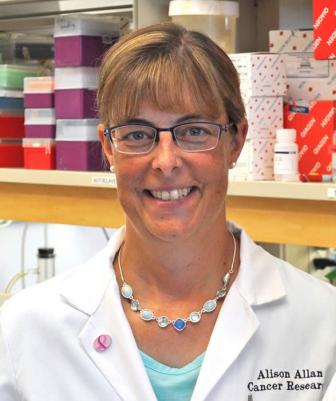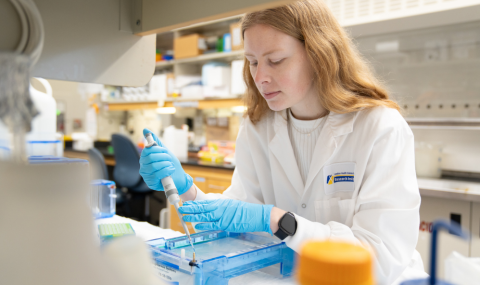Distinguished Oncology Scientist: (formerly) London Regional Cancer Program, London Health Sciences Centre
Director: Breast Cancer Canada Translational Research Unit
Chair: Department of Anatomy & Cell Biology, Schulich School of Medicine and Dentistry, Western University
Joint Appointments: Professor, Departments of Oncology, Anatomy & Cell Biology, Schulich School of Medicine and Dentistry, Western University
Basic Science Co-Lead, Metastasis Translational Cancer Research Team: Western's Centre for Translational Cancer Research
Mailing Address
Cancer Research Laboratory Program
Verspeeten Family Cancer Centre, London Health Sciences Centre
Victoria Research Labs, Room A4-132
London, Ontario
Canada N6A 4L6
Tel: 519-685-8600 extension 55134
Email: Alison Allan
University Website
Research Area
Cellular and Molecular Biology of Metastasis
Key Words: Breast cancer, prostate cancer, metastasis, circulating tumor cells, cancer stem cells, osteopontin, translational research
Research Interests
Dr. Allan’s research interests lie in the study of molecular mechanisms that influence normal cellular growth, tumor development, and cancer progression. The focus of Dr. Allan’s research program is cancer metastasis and translational research. Despite the fact that the majority of deaths from solid cancer occur due to the physiological effects of metastasis rather than from the consequences of the primary tumor, metastasis remains a badly understudied field. A major area of research that is needed to address this problem involves gaining a greater understanding of the metastatic process as a whole, such that current therapies can be better utilized to target metastatic disease, and new, more effective therapies can be developed which will better treat or prevent cancer metastasis. A second important area of research is the identification and development of surrogate marker approaches that will allow close monitoring of both disease progression and response to therapy. Dr. Allan’s research program encompasses both of these areas, and involves two individual but interrelated projects.
Current Projects
1. Gain a greater understanding of the biology of cancer metastasis and investigate opportunities for new therapeutic strategies. This involves pre-clinical molecular, cellular and animal studies focused on cancer stem cells and the metastatic microenvironment.
2. Develop and validate clinical blood biomarker approaches for monitoring of metastatic progression and therapy response. This involves translational studies and clinical trials with oncologists, assessing circulating tumor cells, cell-free DNA, and circulating immune cells in patients to track disease progression and assess therapy response.
DR. ALLAN'S PUBLICATIONS
Media and Video Links
Profile of Excellence, Schulich School of Medicine & Dentistry:
What's Your Why?
London Health Sciences Foundation
Schulich Rapport Magazine, August 28, 2022: New Frontiers in Breast Cancer
https://www.schulich.uwo.ca/rapport/2022/research/new_frontiers_in_breast_cancer_research.html
Media Story: Blood test can predict optimal treatment for advanced prostate cancer, July 24, 2018, London Free Press:
https://lfpress.com/news/local-news/study-shows-blood-test-could-improve-survival-for-prostate-cancer-patients



